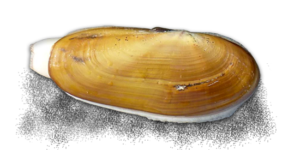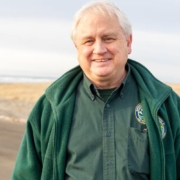Razor Clam Manager Dan Ayers Retires
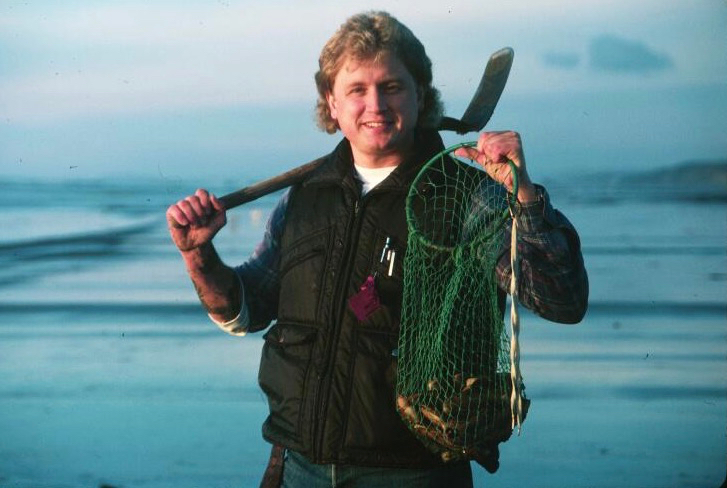
Dan Ayres in March 1990, his first month with Washington Dept. of Fish and Wildlife, WDFW, then called the Dept. of Fisheries. He holds a net full of clams dug with a shovel. The agency put the photo on the cover of an annual agency regulation pamphlet.
Dan Ayers was the face of razor clamming for more than 20 years. He retired from his position as razor clam manager with Washington Dept. of Fish and Wildlife in early 2023, a celebrity on the coast where the razor clams live. He was often buttonholed by diggers eager to share the delights of razor clamming, or castigate him about something or another. Most fishery managers labor in obscurity, but not Ayers. He wasn’t an anonymous figure at the grocery store.
I spoke with Ayers about six months after he retired. I was curious if he had had his fill of the razor clams, or was still was an enthusiast. I was relieved when he said he still likes to dig clams. He said he had thought long and hard before taking the manager’s position, afraid it would ruin something he loved — he had grown up razor clamming, taught by his dad.
Now in his late 60s, Ayers says razor clamming is still fun. He loves to go, as do his two daughters, who he says are good at it. He’s happy he can pick the weather, and happy not to have to watch out for folks taking too many clams or digging on a closed beach.
Since retirement Ayers has been active in his Montesano community, providing food to homeless populations 150 meals at a time. He’s growing beets and vegetables on his several acres of rich soil, selling the produce at a summer stand. And he’s developing new developing recipes since he likes to cook. But he admits missing the excitement of being head honcho for an activity that enthralls so many citizens. He says it was hard leaving a dynamic fishery that can attract 30,000 people over the course of four hours. “I miss being part of that, but it was time.”
He still digs clams, did I mention?
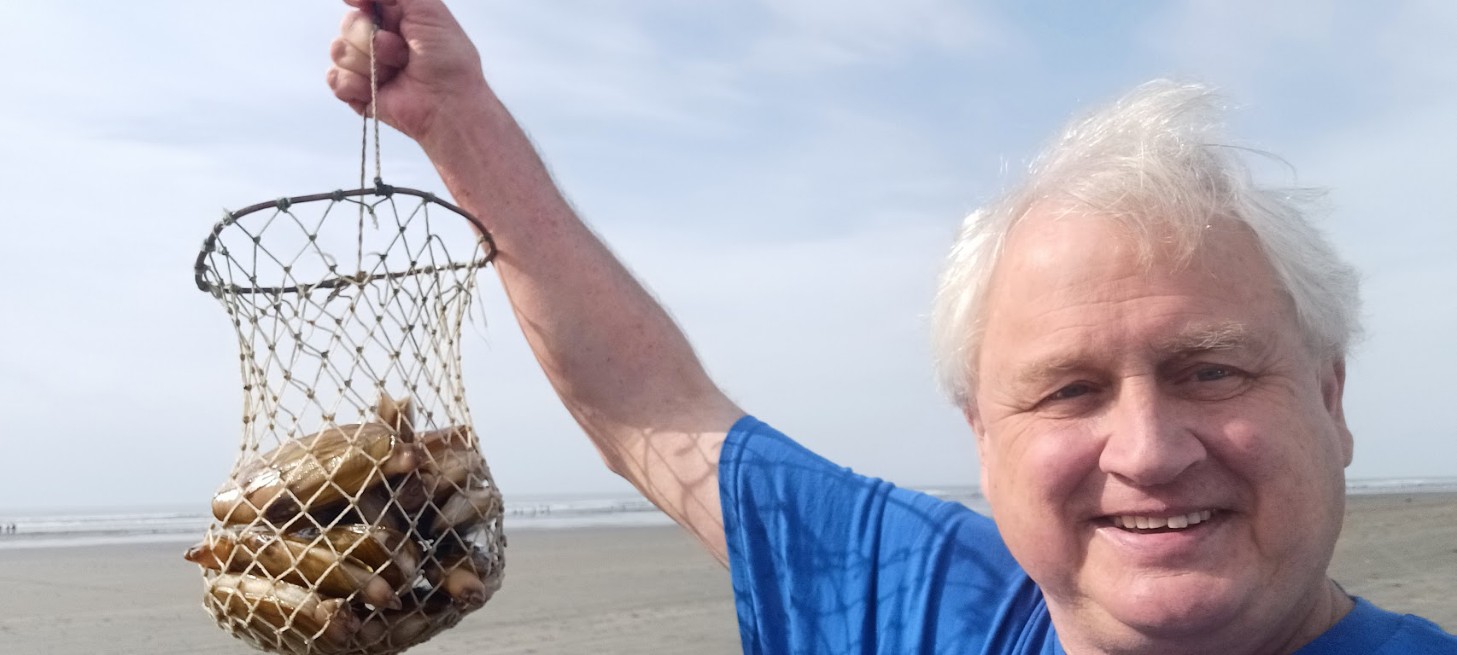
A post-retirement dig at Twin Harbors, in the spring
Ayres was manager 1999 to 2023. Among his signature achievements was introducing the pumped area method for assessing clam populations. The method is now standard procedure in Oregon and California as well as Washington, and even authorities in Alaska, where the method was pioneered, came to the state to relearn the technique.
During Ayres’ tenure there were dramatic challenges in the fishery. Among the scariest was the emergence of the neurotoxin domoic acid. Domoic acid can accumulate in the clams when they filter feed microscopic organisms that, for reasons not fully understood, sometimes produce domoic acid. Eating clams that have an accumulation of domoic acid could make a body sick or even cause death. It’s a sad fact that nowadays there are closures as long as a year or more when high levels of domoic acid are detected.
Another big change during Ayres’ term was the forced sharing of clams with native tribes like the Quinault Indian Nation, because of the Rafeedie court decision which was a corollary to the Boldt decision concerning salmon. The Rafeedie decision changed razor clamming , giving treaty tribes the right to harvest half the available razor clams and a say in management.
And of course there were ups and down in the razor clam populations, part of the normal vagaries of a living natural resource.
The new manager, Bryce Blumenthal, will face his own challenges, not least the high temperatures reported in the ocean, which likely will have adverse affects on clams, and longer term the Damocles sword of climate change and related changing ocean chemistry.
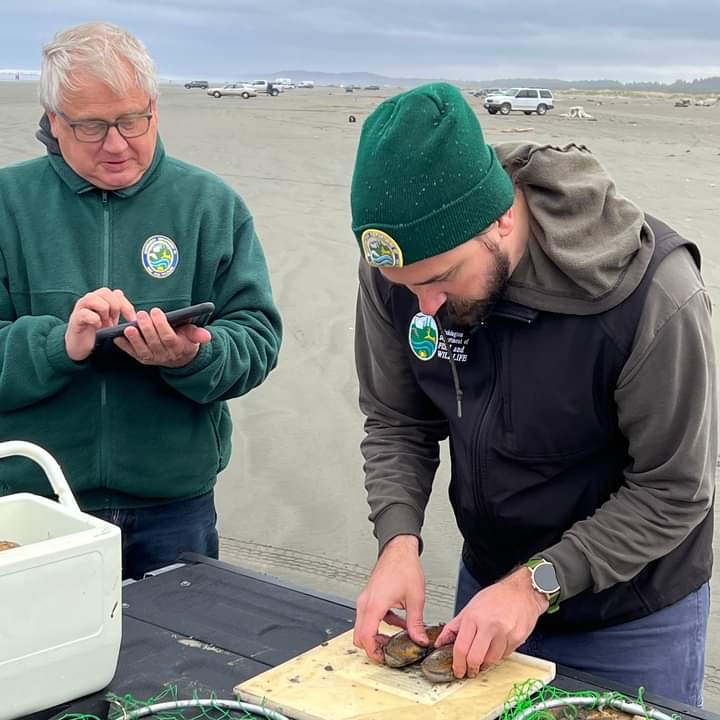
Ayres working at Copalis beach during his last fall opening, in 2022, with Bryce Blumenthal, the new razor clam manager
What sticks out most for Ayres, as he reflects on his tenure and razor clamming, is happy people. Razor clamming is such a positive uplifting experience for people and families, from toddlers to senior citizens, he says. Indeed, it’s hard to come up with anything else quite like it anywhere in the world.
Ayres shared one very personal “happy people memory” as he recalled his long career with razor clams and natural resources (he also oversaw coastal shrimp and crab). Here is the story, lightly edited:
“We’d had a closure of razor clams for like 18 months due to domoic acid. We finally opened in late November. We just put the pedal to the metal and let people dig every day, including Christmas Eve, which was something we’d never done before. I wasn’t married yet. What year would that have been? Like ‘95 or something or earlier, maybe ‘93.
I just couldn’t bring myself to make my staff work on Christmas Eve. The traditional Christmas Eve with my parents in Aberdeen, they were both alive, had been shifted to the following day because my sister had kids; so I could work. So I said, I’ll work; I’m just going to go do it.
My dad was sitting around home and my mom was busy, she wanted him out of the house because she was preparing for the next day. And he said, can I go with you? And I said sure. So I mean, that wasn’t exactly kosher. I wasn’t supposed to allow that, but I thought nobody’s going to care or notice. So he came with me.
We drove out to Mocrocks [near the town of Moclips]. I was just going to monitor the one beach and we could expand from there. It was a beautiful evening. The sun was just setting as people were finishing and it was a pink color in the sky and there weren’t a lot of people. There might have been 500 people on Mocrocks, total— just saying that seems a little ridiculous, because most fishery managers would say, wow, there’s 500 people! But it was just 500 people. And we were driving along, talking to people to see how they did. People had put up battery-operated Christmas lights around the back of their pickups and had big smorgasbords set out with smoked salmon and cold beer and one thing or another. And as we stopped along the way, we were offered all these different bits and bites of food, and my dad had a beer. I couldn’t do that because I was driving a state truck. But it was just a really memorable evening.
Many many years later in 2011, my dad was on his last legs. We were sitting around talking. I asked him if he remembered that night, and he said, “Absolutely. That was one of my favorite nights with you.”
Oh, I’m going to tear up.
And it was one of my favorite nights with him, because he was seeing what I do, and people appreciating the work that we do. And it was just. . . I think there might be a German word for that, gemütlichkeit, you know, that warm, fuzzy feeling of everything coming together and right in the world. You know? Razor clams are back open. I’m with my dad. It’s Christmas tomorrow. People are happy. I just had a great piece of smoked salmon. That’s one of my favorite times. And it just kind of epitomizes the beauty of the coast, where we got to work every day, with a resource that is so abundant; and people are enjoying it. You couldn’t ask for more in a career, I don’t think . . .
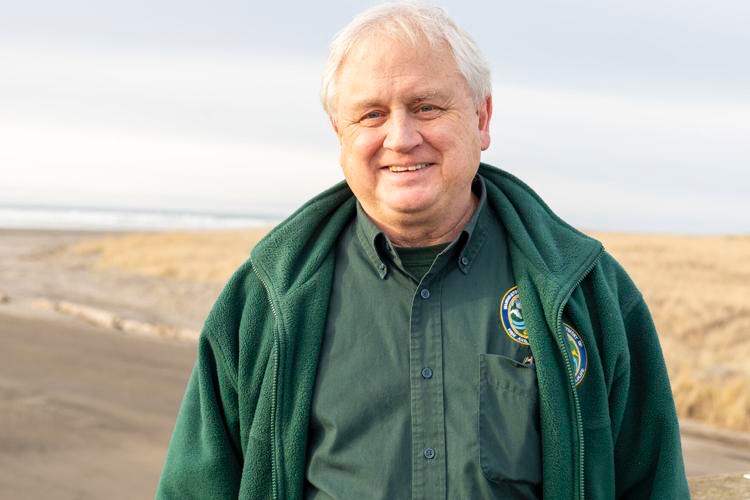
<Razor clam manager Dan Ayers at Long Beach in 2023, shortly before retiring >
